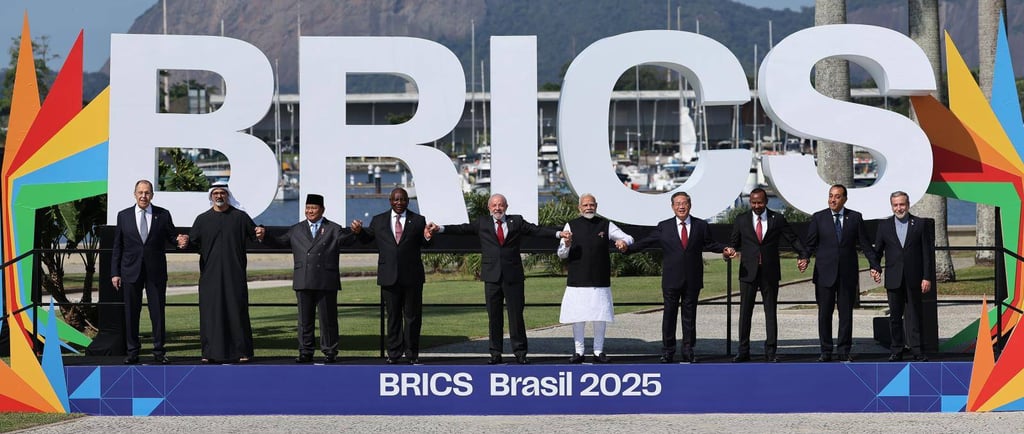BRICS in Rio 2025: A Turning Point or Missed Opportunity for Africa?
Farouk Hussein Abo Deif – Political Researcher, specializing in African affairs
7/24/20253 min read


The 2025 BRICS Summit in Rio de Janeiro unfolded at a critical moment of global realignment. As trust in traditional Western-led institutions wanes, nations of the Global South are increasingly turning to alternative platforms to amplify their voices. With the recent inclusion of Egypt and Ethiopia, Africa’s presence in the BRICS bloc has never been stronger, sparking hope that this summit could mark a new era of equitable partnership.
But as the dust settles, a critical question emerges: Did the Rio Summit represent a strategic breakthrough for Africa, or was it another grand stage for symbolic gestures with little substance?
A Summit of Contradictions
The Rio summit was a study in contrasts. On one hand, it showcased the expanding ambition of BRICS as a counterweight to Western dominance. The expanded African delegation—including South Africa, Egypt, Ethiopia, Nigeria, and Angola—signaled a historic shift in the bloc’s composition and a recognition of the continent’s risingimportance.
On the other hand, the summit exposed the deep cracks in the BRICS foundation. The absence of key leaders from China and Russia cast a shadow over the bloc’s unity, while its weak institutional structure and lack of enforcement mechanisms raised serious doubts about its ability to deliver on its lofty promises.
For Africa, this gap between rhetoric and reality was stark. Calls for debt relief, food security, and equitable financing were met with applause but lacked concrete action plans, timelines, or funding. The New Development Bank (NDB), hailed as an alternative to the IMF and World Bank, has yet to finance a single project on the African continent. This disconnect left many wondering if Africa is seen as a genuine partner or merely a pawn in a larger geopolitical game.
Africa's Priorities on the World Stage
African leaders came to Rio with a clear set of priorities, hoping to leverage the BRICS platform to address the continent’s most pressing challenges:
Debt Relief and Fair Financing: With many African nations crippled by debt, the continent sought alternative financing mechanisms free from the stringent conditions imposed by Western institutions.
Infrastructure Investment: Africa faces a massive infrastructure gap. The hope was that BRICS, and particularly the NDB, would step up to fund critical cross-border projects in energy and transport.
Food Security: Amid climate change and supply chain disruptions, African nations pushed for a BRICS-wide food initiative to boost agricultural productivity through technology transfer and investment.
Reforming Global Governance: A central goal was to use BRICS as a vehicle to demand a greater voice for Africa in global financial institutions and a permanent seat on the UN Security Council.
The Hurdles Ahead: A Reality Check
Despite the potential, Africa's path within BRICS is fraught with challenges.
Geopolitical Pressure: The West, particularly the United States, views BRICS expansion as a threat. The prospect of sanctions or economic pressure on African nations aligning with the bloc creates a difficult balancing act.
Internal Disunity: Africa’s own fragmented approach undermines its collective influence. The failure to agree on a candidate for a UN Security Council seat is a prime example of how internal divisions can squander opportunities on the global stage.
Structural Imbalance: BRICS remains dominated by giants like China and India. Without clear mechanisms for equitable influence, Africa risks being marginalized in a bloc that claims to champion its interests.
A Strategic Wake-Up Call for Africa
The Rio Summit was neither a total failure nor a resounding success. Instead, it served as a crucial reality check. It highlighted the limitations of a bloc still struggling to define its identity and purpose, while simultaneously underscoring Africa’s growing awareness of its own agency in a multipolar world.
For Africa, the path forward is clear. Symbolic participation is not enough. To turn the promise of BRICS into tangible benefits, the continent must:
Coordinate its positions and speak with a unified voice.
Demand accountability and concrete, measurable outcomes.
Engage strategically, leveraging the platform to advance its own interests rather than simply reacting to the agendas of others.
The Rio summit was a test. It revealed the potential of a new global order but also the immense work required to build it. For Africa, this is a pivotal moment to shift from being a spectator in global affairs to a strategic and indispensable actor. The opportunity is there for the taking, but it will require a new level of unity, focus, and resolve.
Download the full study here.
Empowerment
Amplifying African voices for sustainable progress together.
Contact US
Growth
Street No. 3281, N'Djamena, Republic of Chad.
© 2024. All rights reserved.